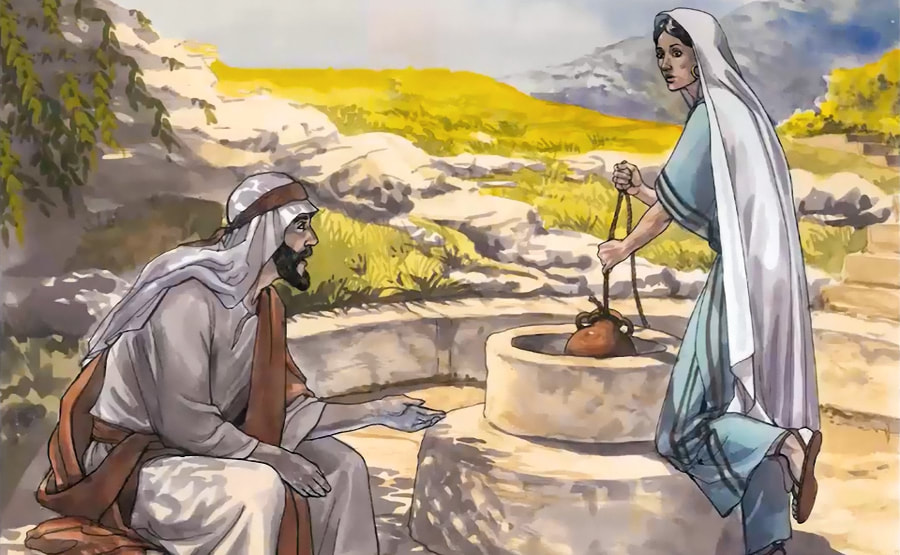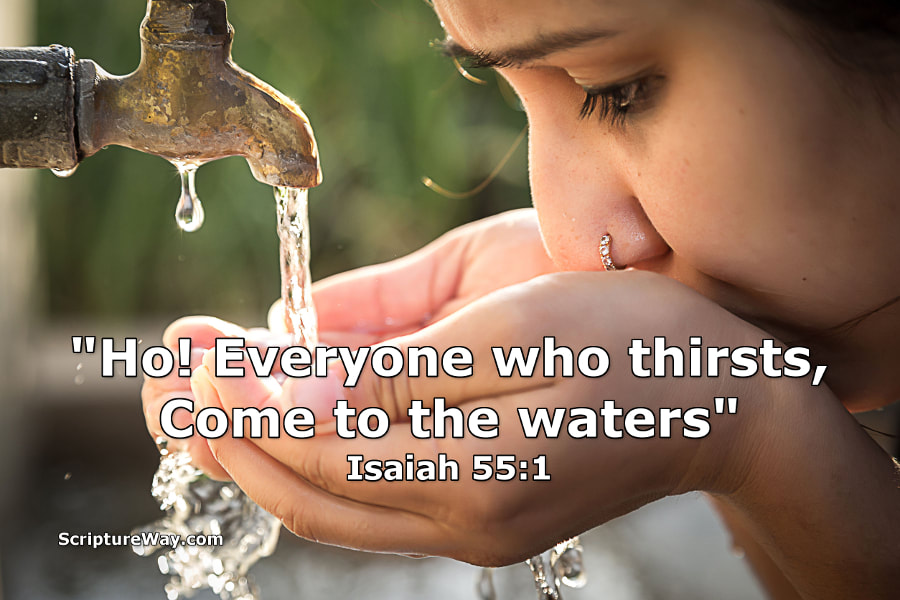Photo Copyright: koca777
"A righteous person who walks in his integrity--How blessed are his sons after him." (Proverbs 20:7)
This lesson explains the biblical meaning of "integrity" and "walking in integrity."
Consider. Are you "walking in integrity"? Is your integrity a good example for your children to follow?
1. What is the biblical meaning of "integrity"?
In the Old Testament, the most-often occurring Hebrew word translated as "integrity" is tom (pronounced tome) (Englishman's Concordance, Ref. 1). The Hebrew word tom means moral innocence, full, integrity, perfection, simplicity, and uprightness (Strong's Exhaustive Concordance, Ref. 1). Dictionary.com defines "integrity" as adherence to moral and ethical principles; soundness of moral character; and honesty (Ref. 2).
The biblical teaching about integrity comes primarily from the Old Testament. Abimelech pleaded his integrity and innocence before God after Abraham had told Abimelech that Sarah was his sister but didn't mention that she was his wife (Genesis 20:1-6). David purposed to walk within his house in the integrity of his heart (Psalm 101:2), and he recognized that integrity preserved him (Psalm 25:21). Solomon wrote wonderful proverbs describing the benefits of integrity. Refer to Proverbs 2:7, 10:9, 11:3, 19:1, 20:7, and 28:6. In the King James Version, the word "integrity" does not occur in the New Testament. However, the New Testament does describe virtues such as truth, honesty, and purity that are necessary components of integrity. For example, see Philippians 4:8. 2. "Walking in integrity" is a way of life and conduct
In the Bible, the words "walk" and "walking" figuratively mean a way of life and conduct (Ref. 3). "Walking in integrity" denotes a way of life and conduct that is complete, upright, and morally innocent (Ref. 1). David wrote, "Lord, who may reside in Your tent? Who may settle on Your holy hill? One who walks with integrity, practices righteousness, and speaks truth in his heart" (Psalm 15:1-2).
Walking in integrity begins at home. David wrote, "I will carefully attend to the blameless way. When will You come to me? I will walk within my house in the integrity of my heart" (Psalm 101:2, italics added). Our good example of walking in integrity begins in our household. 3. "Walking in Integrity" has important benefits
"Walking in integrity" has several important benefits. The Bible contrasts the benefits of integrity versus the pitfalls of crookedness and perversity.
a. Security
Proverbs 10:9 -- Solomon wrote, "Whoever walks in integrity walks securely, but he who makes his ways crooked will be found out." When we walk in integrity we live with security -- with confidence, assurance, refuge in God, and no fear of being "found out."
b. Preservation
Psalm 25:21 -- David wrote, "Let integrity and uprightness preserve me, for I wait for You." "Preserve" means guard from dangers (Ref. 4). Integrity and uprightness guard us from dangers. The following attributes also guard us from dangers -- discretion (Proverbs 2:11), wisdom (Proverbs 4:5-6), and righteousness (Proverbs 13:6).
c. Blessing to your children
Proverbs 20:7 -- "A righteous person who walks in his integrity--How blessed are his sons after him." Parents today -- here is something you can do to improve the life of your children. Live a pure life, a life of integrity, a life that is a good example of duty to God and mankind (Ref. 5). Your life will bring blessings to your children during your lifetime and to succeeding generations after your death.
Apply. Are you walking in integrity? Is your life every day a good example for others to follow, especially your children?
References
1. https://biblehub.com/hebrew/8537.htm 2. https://www.dictionary.com/browse/integrity 3. https://biblehub.com/commentaries/barnes/psalms/1.htm Barnes' Notes on Psalm 1:1 4. https://biblehub.com/hebrew/5341.htm 5. https://biblehub.com/commentaries/pulpit/proverbs/20.htm - Pulpit Commentary on Proverbs 20:7
3 Comments
"Jesus answered her, 'If you knew the gift of God, and who it is that is saying to you, ‘Give me a drink,’ you would have asked him, and he would have given you living water.'" (John 4:10)
This lesson explains the meaning of living water in the Bible, and provides examples of living water -- physical and spiritual -- from the Old and New Testaments.
Consider. What does "living water" mean to you? How would you explain "living water" to someone else?
"Living water" in the Bible refers both to flowing, fresh, pure water that satisfies our thirst in the physical sense and to perpetual, God-given spiritual blessing and life-giving power that satisfies our thirst in the spiritual sense.
1. Living water is flowing and fresh
"Isaac’s servants dug in the valley and found there a well of flowing [living] water" (Genesis 26:19, brackets added, Ref. 1). Read Genesis 36:18-22 for context.
"Living water" in the physical sense is water that is flowing and fresh as from a running stream or a perennial spring. Its motion and freshness resembles life, in contrast with stagnant water or water that is turbid (muddy or sediment-filled) or salty. The Hebrew word for flowing in Genesis 26:19 is chay (pronounced khah'-ee). Chay is an adjective which means alive or living (Strong's Concordance - Ref. 1). When chay describes water, it means flowing and fresh (Brown-Driver-Briggs - Ref. 1). Also see Zechariah 14:8. In the Bible, living water in the physical sense implies freshness, movement, and life. 2. Living water is spiritual blessing and life-giving power
Living water in the spiritual sense is spiritual blessing and life-giving power. God is the source -- the fountain -- of living water for his people. Jesus, the Son of God, is the giver of living water. Unlike the idols, lusts, and material things the world seeks to satisfy its thirsts, the living water that Jesus gives us satisfies our thirsts perpetually and springs up in us to eternal life. The living water that Jesus gives us overflows in us and blesses others.
a. God is the source -- the fountain -- of living water
"For my people have committed two evils: they have forsaken me, the fountain of living waters, and hewed out cisterns for themselves, broken cisterns that can hold no water" (Jeremiah 2:13). Also read Jeremiah 17:13, and Psalm 36:9.
In Jeremiah 2:13, Jeremiah 17:13, and Psalm 36:9, the Hebrew word for fountain is maqor (pronounced maw-kore') and means figuratively a spring (Ref. 2). God, the fountain [or spring] of living water, provided the Israelites every blessing they needed. Yet, the Israelites deserted God, practiced idolatry, and sought after gods that would not profit them (Jeremiah 2:8-11). Today, God, the fountain of living water, provides us every blessing we need. That brings up the question -- Are you seeking God who can truly satisfy your thirst, or are you trusting in "broken cisterns that can hold no water" (Jeremiah 2:13)? b. Jesus Christ -- the Son of God -- is the giver of living water
"Jesus answered her, 'If you knew the gift of God, and who it is that is saying to you, ‘Give me a drink,’ you would have asked him, and he would have given you living water'" (John 4:10). Read John 4:1-15 for context.
Jesus Christ -- the Son of God, the Messiah -- is the giver of living water (John 4:10, John 4:14). However, in John 4:10, early in his conversation with the woman at the well, there were two impediments preventing the woman from receiving the living water that Jesus gives. First, she did not know [Greek word eidó means perceive] who it was who was speaking to her (Ref. 3). At first she thought Jesus was an ordinary Jew (John 4:9). Later in the conversation she did understand who Jesus was -- the Messiah, the Christ -- and she proclaimed Jesus to the people of her town (John 4:25-26, John 4:28-29) resulting in their coming to Christ (John 4:39-42). Second, when Jesus began the conversation with the woman at the well, she did not know [perceive] what the gift of living water really was (and still is). When Jesus first mentioned living water to her (John 4:10), she thought of living water only in the physical, flowing sense (John 4:11). Moments later in the conversation, Jesus helped her to think of living water in the spiritual sense. In John 4:13, Jesus said (referring to the physical well water), "Everyone who drinks of this water will thirst again." Jesus then explained the spiritual benefits of living water. "Whoever drinks of the water that I will give him will never be thirsty again. The water that I will give him will become in him a spring of water welling up to eternal life" (John 4:14). When Jesus described the spiritual meaning of living water -- perpetual, life-giving power that springs up to eternal life (John 4:14) -- the woman then expressed her desire to have that living water. She said, "Sir, give me this water, so that I will not be thirsty or have to come here to draw water" (John 4:15). So, note the two conditions from John 4:10-15 for receiving the life-giving living water that Jesus gives: 1) Perceive who Jesus really is (the Messiah, the Christ), and 2) Desire to have the living water that Jesus is willing to give. c. The living water that Jesus gives us satisfies our thirsts perpetually and springs up in us to eternal life
"Whoever drinks of the water that I will give him shall never be thirsty; but the water that I will give him will become in him a fountain of water springing up to eternal life" (John 4:14).
(1). The living water that Jesus gives us is eternal in its duration and satisfies our thirsts completely
Jesus said to the woman, "Whoever drinks of the water that I will give him shall never be thirsty" (John 4:14). Jesus recognized that the Samaritan woman was thirsty; however, she was seeking to satisfy her thirst in the ways of the world (John 4:16-18, 1 John 2:15-17). In contrast with the ways of the world which are temporary and cannot satisfy our spiritual thirst (broken cisterns that can hold no water), the living water that Jesus Christ gives us eternally satisfies our thirst.
(2). The living water that Jesus gives us becomes in us a fountain springing up to eternal life
Jesus said, "The water that I will give him will become in him a fountain of water springing up to eternal life" (John 4:14). The living water that Jesus gives us as believers -- spiritual blessing and life-giving power -- is a perpetually flowing fountain within us that is active, dynamic, and vigorous. The Greek word that John uses for springing is hallomai (pronounced hal'-lom-ahee) which means leaping, springing, gushing (Ref. 4). The living water that Jesus gives us provides us abundant life (John 10:10). The living water that Jesus gives us helps us to enjoy the quality of eternal life now with him while we are on earth and as we anticipate being in heaven with him.
d. The living water that Jesus gives us flows from us and blesses others
Jesus said, "He who believes in Me, as the Scripture said, 'From his innermost being will flow rivers of living water'" (John 7:38).
To discuss this verse, let's consider "three directions" -- to us, in us, and from us to others. To us -- God is the source, the fountain of living water (Jeremiah 2:13). That living water -- God's blessing and spiritual power -- flows from God to us (Isaiah 44:3). In us -- The living water that Jesus gives us is a life-giving fountain that springs up in us (John 4:14). The living water that Jesus gives us completely satisfies our thirsts and endures to eternal life. From us to others -- Jesus said that for those that believe in him, from our innermost being "will flow rivers of living water" (John 7:38). From God we shall receive an abundance of spiritual blessings not only to refresh us, but also so we can be instrumental in refreshing and comforting others (Ref. 5). As believers, we do not "end" at satisfying our own thirsts, but we become a fount, using the spiritual gifts God has given us, so others may derive refreshment (Ref. 6). As faithful stewards of God's grace, we are to use the gifts, spiritual blessings, and life-giving power that God has given us to bless others (1 Peter 4:10).
Apply. Know "the thirst of your soul, the readiness of the Giver, and the sweetness of the living water that Jesus offers. Fall at his feet and ask, and get the water of life" (Alexander MacLaren - Ref. 7, John 4:15).
Related Lessons
"Come to the Waters (Isaiah 55:1)" "What is Eternal Life?" (John 17:3) "Do Not Love the World" (1 John 2:15)
References
1. https://biblehub.com/hebrew/2416.htm 2. https://biblehub.com/hebrew/4726.htm 3. https://biblehub.com/greek/1492.htm 4. https://biblehub.com/greek/242.htm 5. https://biblehub.com/commentaries/benson/john/7.htm Commentary on John 7:38 6. https://biblehub.com/commentaries/cambridge/john/7.htm Commentary on John 7:38 7. https://biblehub.com/commentaries/maclaren/john/4.htm Commentary on John 4:10
"Ho! Everyone who thirsts, Come to the waters; And you who have no money, Come, buy and eat. Yes, come, buy wine and milk Without money and without price." (Isaiah 55:1)
This lesson explains God’s great invitation in Isaiah 55:1, "Everyone who thirsts, come to the waters," and "Come, buy wine and milk without money and without price."
This lesson is the second in a series on God's Invitations in the Bible, specifically, the "Comes" of God's word. The first lesson in the series was "Come Now, Let Us Reason Together (Isaiah 1:18)" (Ref. 1).
Consider. Are you are spiritually thirsty or hungry? Come to God and find true refreshment and nourishment for your soul.
Everyone Who Thirsts
God invites thirsty people to come to him. When you are thirsty, you know that you have an intense desire to satisfy your thirst (for example, with a drink of water). When you are a sinner you may already sense your need for salvation (Matthew 5:6, Ref. 2). God, and only God, is the one who can satisfy your thirst.
The Psalmist recognized the thirsting of his soul when he wrote, "As a deer pants for flowing streams, so pants my soul for you, O God. My soul thirsts for God, for the living God" (Psalm 42:1-2). Come to the Waters
God himself is the source of the spiritual water that truly refreshes and revives. The Lord said, "For I will pour water on the thirsty land, and streams on the dry ground; I will pour my Spirit upon your offspring, and my blessing on your descendants" (Isaiah 44:3). Likewise, when Jesus, the Son of God, encountered the Samaritan woman at the well, he said to her, "Whoever drinks of the water that I shall give him will never thirst. But the water that I shall give him will become in him a fountain of water springing up into everlasting life" (John 4:13-14).
God invites you to come to him to satisfy your spiritual thirst (John 7:37). Come, Buy, and Eat
God provides food that truly satisfies, and it is free. God alludes to the food that satisfies in Isaiah 55:2, "Why do you spend your money for that which is not bread, and your labor for that which does not satisfy?
The real blessing, the real food which truly satisfies people's wants and desires is Jesus himself. Jesus said, "I am the bread of life; whoever comes to me shall not hunger, and whoever believes in me shall never thirst" (John 6:35, Ref. 3). Come, Buy Wine and Milk without Money and without Price
In Isaiah 55:1, wine and milk are figurative for God's choicest blessings (Ref. 4). Wine is a gift of God (Genesis 27:28). Melchizedek, priest of God Most High, brought wine and bread together to Abraham (Genesis 14:18). The Psalmist wrote that wine gladdens the heart of man (Psalm 104:14-15). Milk provides nourishment needed for sustenance and growth (Proverbs 27:27, 1 Peter 2:2).
God offers spiritual blessing without money and without price. No silver or gold can buy the blessing which God offers (Ref. 5). Jesus Christ himself is the gift that God freely offers (John 3:16). Jesus himself is the all-sufficient supply for every thirst of your soul (John 7:37, Ref. 6).
Apply. Accept God's invitation. Come to God and find true satisfaction for the hunger and thirst of your soul. Put your faith and trust in God's Son, Jesus, who promises, "I am the bread of life; whoever comes to me shall not hunger, and whoever believes in me shall never thirst" (John 6:35).
Related Lessons
"Jesus' Invitation - Come to Me and Rest" (Matthew 11:28-30) "Come Now, Let Us Reason Together (Isaiah 1:18)" "Jesus is the Bread of Life" (John 6:35)
References
1. http://www.scriptureway.com/home/come-now-let-us-reason-together-isaiah-118 2. https://biblehub.com/commentaries/barnes/isaiah/55.htm 3. http://www.ScriptureWay.com/home/jesus-is-the-bread-of-life 4. https://biblehub.com/hebrew/2461.htm 5. https://biblehub.com/commentaries/ellicott/isaiah/55.htm 6. https://biblehub.com/commentaries/maclaren/isaiah/55.htm
"You shall walk in all the way that the Lord your God has commanded you, that you may live, and that it may go well with you, and that you may live long in the land that you shall possess." (Deuteronomy 5:33) Consider. Jesus said "I am the way" (John 14:6). The "way of the Lord" was a concept familiar to Jesus' Jewish listeners. Consider these principles from the Old Testament. What was the way that God had commanded? Please read through the Ten Commandments (Deuteronomy 5:1-21). Consider the three-fold blessing God promises for the nations and people who keep his commandments – "that you may live, and that it may go well with you, and that you may live long in the land which you shall possess" (Deuteronomy 5:33).  Gettysburg National Military Park Path with Psalm 25:4 - Photo by Whitney V. Myers Gettysburg National Military Park Path with Psalm 25:4 - Photo by Whitney V. Myers David asked God to "Teach me Thy way, O Lord." "Teach me your way, O Lord, and lead me on a level path because of my enemies" (Psalm 27:11). "Make me to know your ways, O Lord; teach me your paths" (Psalm 25:4). David’s request to God, "Teach me Thy way, O Lord," is an excellent example for us to follow. Apply. Are you walking in the way of the Lord? Are you obeying God's commandments? Deuteronomy 5:1-21 Related Lessons "What Does 'the Way' Mean in the New Testament?" "Psalm 37:5 Meaning - Commit Your Way to the Lord" To learn more about the following topics, please visit the About the Way page or the previous posts with dates noted:
|
Daily Bible Verse(Click the link above) AuthorMr. Whitney V. Myers. Christian. For more information, please visit the Author Page. Posting ScheduleI plan to provide new postings about once a month. Planned Topics(subject to change) Recent Posts(most recent three months) Popular Posts(top 10) Categories
All
Archives
July 2024
|
|
Copyright 2018-2024 Whitney V. Myers |
Listed in Feedspot's Top 100 Bible Study Blogs and Websites |




 RSS Feed
RSS Feed
